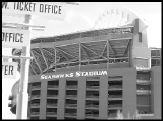When Seattle’s sky-view football stadium debuts with a public grand opening this weekend, Armen Yousoufian will likely be busy elsewhere. Almost daily, the Seattle hotelier pores over his ever-growing mass of stadium election and financing documents, looking for evidence of political unsportsmanlike conduct. Last October, the die-hard stadium critic won the largest public-disclosure case in state history after King County stonewalled his Herculean stadium documents requests [see “Document Diver,” April 18]. A sore winner, he has appealed the $114,000 award because he spent $140,000 on the case. He also thinks county officials are still stonewalling. Last month, he unearthed documents the county had insisted didn’t exist, he claims, although Elaine Kraft, spokesperson for King County Executive Ron Sims, says that they have “complied to the fullest degree possible to respond to his requests,” and have changed some procedures for providing records to ease the process.
Yousoufian, 55, a self-described average taxpayer turned mad-as-hell documents snoop, thinks voters would never have approved the stadium in 1997 (by just 51 percent) if some of the records he has uncovered had been made public then. Today, with the stadium built, Yousoufian’s goals are: Prove fraud, throw a politician or two out of office, and make billionaire Seahawks owner and stadium conceiver Paul Allen pick up the whole $430 million tab (actually, it’s about $1 billion in taxpayer money when counting interest and Kingdome debt).
Yousoufian, the Danny Devito-like owner of University Plaza hotel, is wealthy enough and angry enough to employ two attorneys to handle his case. His readings—he recently added 900 pages to his makeshift library of county contracts, memos, planning documents, blueprints, and audiotapes—have left him surprised and dismayed. It’s amazing, he says, “how assumptions and specifications to the consultants doing these [new stadium] studies seem rigged.” Allen contributed heavily to the election, the campaign, and the studies that claimed a new stadium would be better for fans and taxpayers than sprucing up the aging Kingdome.
Were those studies done with preordained outcomes? Yousoufian thinks so, and that’s the heart of the case he hopes to build. His documents—reviewed by Seattle Weekly—show, for example, how one stadium feasibility study was undertaken by the only consulting firm that Allen would accept (requiring the county, which split the $300,000 study costs, to issue a waiver circumventing competitive bidding). They also indicate that the study, by HOK Sport of Kansas City, was already completed—and the consulting firm had already earned $200,000 in fees—before the contracts were actually signed.
In a Dec. 2, 1996, memo to a stadium-planning official, a county administrative aide noted that she had not seen some necessary papers “that must go uptown [to county offices] if were are [sic] to enter into a contract with [HOK].” She added: “I suggest we do it before their report comes out, or at least start the process.” In fact, HOK had already produced numerous interim reports. The final report was issued only a week later. The contract was signed two weeks after that.
A King County source says the belated contract signing may have been an allowable formality in the wake of earlier casual agreements, if, for example, the county executive had declared the study an emergency. Last week, Sims’ office said—without elaboration—it “cannot comment” on any of Yousoufian’s paper discoveries.
To Yousoufian, the rushed study with a predictable finding was intended to get the bandwagon rolling inexorably toward stadium approval. Among the missing details, he says, was a disclaimer from another consulting firm, Houlihan Lokey of Chicago, which provided crucial financial data to HOK for its study (which compared Kingdome costs with that of new stadiums on the same site or in the burbs). In a letter found by Yousoufian, the Chicago consultant said it would not make any on-site Seattle inspections to obtain its assessment, that the “rapid turnaround” required would limit the quality of its figures, and that the data might even lack “meaningful form.”
HOK’s final report nonetheless helped influence a stadium task force to recommend a new facility, as Allen wished. In part, HOK claimed a new stadium would cost only $40 million more than a Kingdome makeover. The report was used by officials and proponents to sway the Legislature to put the measure on the ballot, and cited in the campaign to persuade voters.
Yousoufian hopes to follow this and other aspects of the election further, but, he said last week, “There is no doubt that if the material I have finally seen and threaded together were available to me and the public within five days of my original May 30, 1997, request [the vote was held June 17, 1997], at least 1 percent of the vote would have gone the other way.” And this weekend, the public might be invited to the grand reopening of the Kingdome.









